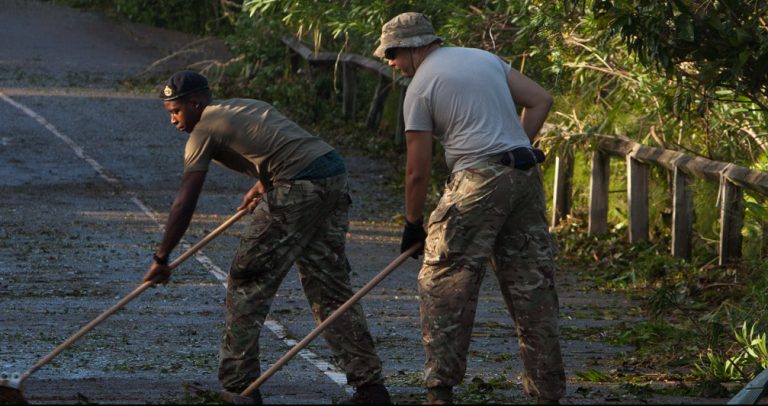By TIM SMITH
They do their job so efficiently it’s easy to take them for granted, but hurricane duty is not exactly a breeze for the teams who put Bermuda back together again after a major storm.
Soldiers from the Royal Bermuda Regiment are an increasingly common sight in the aftermath of hurricanes as they clear roads, report damage, clear up at key buildings and even help fix roofs.
Along with other public bodies such as the Bermuda Coast Guard and police, they make sure we can all get back to business as usual with the minimum of fuss.
Major Duncan Simons said: “Our role is to provide a rapid, flexible disaster relief force to support the Emergency Measures Organisation and the other emergency services to prepare for and deal with the effects of a major incident and return the island to normality as fast as possible.”
Soldiers have been called upon in the aftermath of serious storms for many years, but Major Simons said in recent times they have swung into action more frequently.
“What is telling about the past few years or so, from Fay and Gonzalo in 2014, is that the Regiment has been mobilised almost twice a year in advance of storms,” he said.
“Most of them have not been particularly severe, but hurricane embodiments have become more routine.
“The upside to this has been that the amount of debris we have to deal with is less than it would be if we had gone for ten years without a storm.”
The Regiment mobilises in advance of a hurricane so that it is ready to deploy on the ground immediately afterwards.
Major Simons said soldiers are organised into immediate response teams which are each assigned an area of operation: one at the Clearwater Fire Station, a liaison officer at the police operations centre and the remainder at Warwick Camp.
The number of soldiers mobilised depends on the storm’s predicted severity.
“We do what everyone else does at the height of the storm – get our heads down and stay safe,” Major Simons said.
“We send teams out to survey the damage, with the Immediate Response teams following not far behind after the storm has passed and winds drop below hurricane force.”
The Regiment’s primary role is to clear the roads to allow the movement of emergency vehicles.
But Major Simons continued: “We also play a valuable role in reporting downed power lines and damaged infrastructure though Comops.
“We are prepared to assist with clearing-up at schools or other key buildings.
“After Hurricane Fabian, the Regiment was tasked with the initial cleanup of the airport terminal and also cleared the runway of debris.
“If time allows, we will put tarps on the roofs of damaged homes.”
A typical mobilisation lasts from 48 to 72 hours, but some soldiers may be employed a little longer to support Belco’s electricity restoration efforts.
Meanwhile on the water, the Bermuda Coast Guard and Marine and Ports are chiefly responsible for making sure docks are clear and removing debris from shipping lanes.
Clearing up after a storm can take many hours in sometimes difficult conditions, but the teams are well prepared.
Major Simons said: “Throughout the year the Regiment trains for a variety of scenarios from hurricanes, to oil spills, to public disorder.
“But our foundation training is centred on basic infantry skills common to any military unit.
“Long, physically demanding training exercises in Bermuda and overseas, with little sleep, are designed to put soldiers under stress so that if they are mobilised they are up to the job.
“If there is a serious incident, we have resources we can call on to provide our soldiers with the support they need.”
The Regiment’s storm-related work does not end in Bermuda. Four years ago, it helped deal with the devastation of Hurricane Irma in the Caribbean.
It was the Regiment’s second deployment to Grand Turk.
Major Simons said: “A proud moment was our 2017 deployment to assist Grand Turk in Turks & Caicos after Hurricane Irma.
“As an experienced, well organised, and well-resourced unit, we proved our worth as part of the overall British operations.
“We were able to hit the ground running.”
The Regiment has also been previously deployed to the Cayman Islands and Grenada to assist in humanitarian work and disaster relief.
Major Simons urged the Bermuda public to help play their part in hurricane recovery efforts.
People should ensure that any trees or branches that could fall on the road or power lines are cut back before the end of August.
Residents are also warned against going out and looking at the damage immediately after a storm hits.
“Keeping traffic off the roads after a storm goes a long way to ensuring the safety of our soldiers on roads littered with debris,” Major Simons said. “Give us some time and space to do our job.”
He added: “We are a Regiment of citizen soldiers. We depend on members of the public to step forward to serve the country and those that do will be rewarded, financially as well as with increased self-confidence, physical fitness and improved interpersonal skills that will enhance their civilian lives and their military careers.
“We rely on people from all walks of life. Our diversity is our strength and we would encourage people to consider the many rewards of service in the Royal Bermuda Regiment.”

